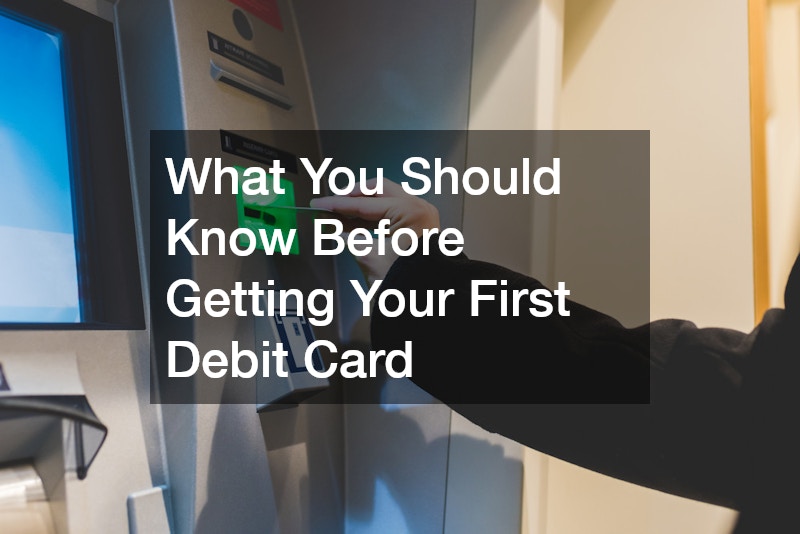
Debit cards have become an integral part of modern financial transactions, offering a convenient alternative to cash and checks. As a primary tool for accessing one’s bank account, these cards are crucial for efficient money management in today’s fast-paced world. This article aims to guide first-time debit card users through understanding their functions, benefits, and how to select the right debit card that aligns with their financial needs.
What is a Debit Card and How Does it Work?
Debit cards differ from credit cards primarily in the source of the funds used for transactions. While credit cards allow users to borrow money up to a specified limit, debit cards deduct funds directly from the user’s bank account. This distinction means that debit cardholders spend only what they have, avoiding debt accumulation common with credit cards.
Moreover, debit cards are generally free from interest charges as there is no borrowing involved. Credit cards often come with higher interest rates if balances are not paid in full each month, which can lead to significant financial burdens. Therefore, debit cards serve users who prefer to avoid debt while maintaining the convenience of plastic payments.
The choice between debit and credit cards should be based on one’s financial goals and discipline. While credit cards offer the advantage of building credit and earning rewards, debit cards are excellent for those prioritizing straightforward budgeting and spending within their means. Both have distinct roles, so understanding their differences is crucial in choosing the appropriate card.
When a cardholder uses a debit card for a purchase, the transaction begins immediately with the merchant sending the payment information to the card network. The network authorizes the transaction by verifying the availability of funds in the cardholder’s bank account. If approved, the bank transfers the appropriate amount to the merchant, and the user’s account balance is updated in real-time.
This seamless process involves several entities working together, including banks, payment processors, and merchants. The efficiency of debit card transactions is facilitated by advanced technology that ensures security and swift processing. Consumers benefit from this quick access to funds for purchases, without the inconvenience of carrying cash.
It’s important to note that while debit transactions are mostly instantaneous, occasional delays can occur due to system updates or network issues. However, such instances are rare and typically resolved quickly by banks or payment networks. Users should feel confident in the robust framework supporting debit card transactions, ensuring reliability and convenience.
Benefits and Drawbacks of Having a Debit Card
One of the main advantages of debit cards is their convenience in daily transactions. They eliminate the need for carrying cash, making them suitable for a variety of payments, from groceries to online shopping. Debit cards also facilitate easy management of personal finances by providing clear transaction records, aiding in budgeting and expenditure tracking.
Unlike credit cards, debit cards do not accrue interest since the funds are drawn directly from a bank account. This means users can avoid the high interest rates typically associated with credit card debt. Furthermore, utilizing debit cards helps promote responsible spending habits, as users are limited to their available balances.
Many debit cards now come with rewards programs, offering cashback or discounts for using the card. This feature enhances the overall value of using debit cards for regular purchases. However, it is essential to assess these benefits while keeping an eye on any potential drawbacks of debit card usage.
While debit cards offer numerous advantages, some limitations exist that users should be aware of. One significant downside is the risk of overspending, where frequent small transactions may lead to unexpectedly low account balances. To avoid this, users should regularly review their statements and set up alerts for low-balance thresholds.
Additionally, debit cards often provide less robust fraud protection compared to credit cards, which may offer zero liability on unauthorized purchases. In the case of unauthorized transactions, the time taken to recover lost funds can disrupt financial plans. Prompt reporting and understanding bank policies can mitigate these issues.
Ultimately, debit cards require a degree of financial discipline to manage effectively. Cardholders should be proactive in safeguarding their information and monitoring account activity to maximize their debit cards’ positive aspects. Balance these factors when considering a debit card and adopt strategies to minimize potential downsides.
How to Choose the Right Debit Card for Your Needs
Choosing the right financial institution is crucial in obtaining a debit card that meets one’s financial needs. Factors such as fees, accessibility, and customer service should be closely evaluated when selecting a bank or credit union. It’s advantageous to choose an institution with a large ATM network to minimize external fees and maintain easy cash access.
Comparing institutions online can provide insights into the range of services offered, including mobile banking and online security features. Customer reviews can also reveal information about service quality and responsiveness. Additionally, smaller local banks or credit unions may offer personalized service and lower fees, depending on the individual’s preferences.
Ultimately, aligning the institution’s offerings with personal financial needs will ensure a satisfactory banking experience. Customers should not hesitate to ask questions and seek information to make informed decisions. This diligence is key in securing a debit card aligned with one’s financial goals and lifestyle.
When selecting a debit card, it’s important to consider the features that will best suit your lifestyle and spending habits. Key features to evaluate include rewards programs, which can offer cashback or points for specific purchases. ATM network availability is also important, helping users avoid excessive fees when accessing cash.
Obtaining your first debit card involves understanding its functions, evaluating its benefits and limitations, and choosing the right card and financial institution. By grasping these fundamental aspects, users can make informed decisions and effectively manage their finances. A debit card can be a powerful financial tool when selected and used wisely, promoting effective budgeting and responsible spending.




